Entrepreneurship: Ventures, SMEs, and Social Economy in the UK
VerifiedAdded on 2023/03/20
|13
|3821
|36
Report
AI Summary
This report provides a detailed analysis of entrepreneurship and small business management. It begins by defining entrepreneurship and exploring different types of entrepreneurial ventures, including small business, scalable startups, social entrepreneurship, serial entrepreneurship, and large-scale entrepreneurship, along with their typologies. The report then delves into the similarities and differences between social and lifestyle entrepreneurship. Furthermore, it examines the impact of small and medium enterprises (SMEs) on the UK economy, highlighting their significance in driving growth and contributing to employment. The report also explores the characteristics, traits, and skills of successful entrepreneurs, discussing how personality and mindset influence their motivations. Finally, it considers how personal background, skills, and experiences can either foster or hinder entrepreneurial success. The report emphasizes the importance of SMEs in the UK's economic landscape and their role in innovation and job creation.

Entrepreneurship and Small
Business Management
Business Management
Paraphrase This Document
Need a fresh take? Get an instant paraphrase of this document with our AI Paraphraser
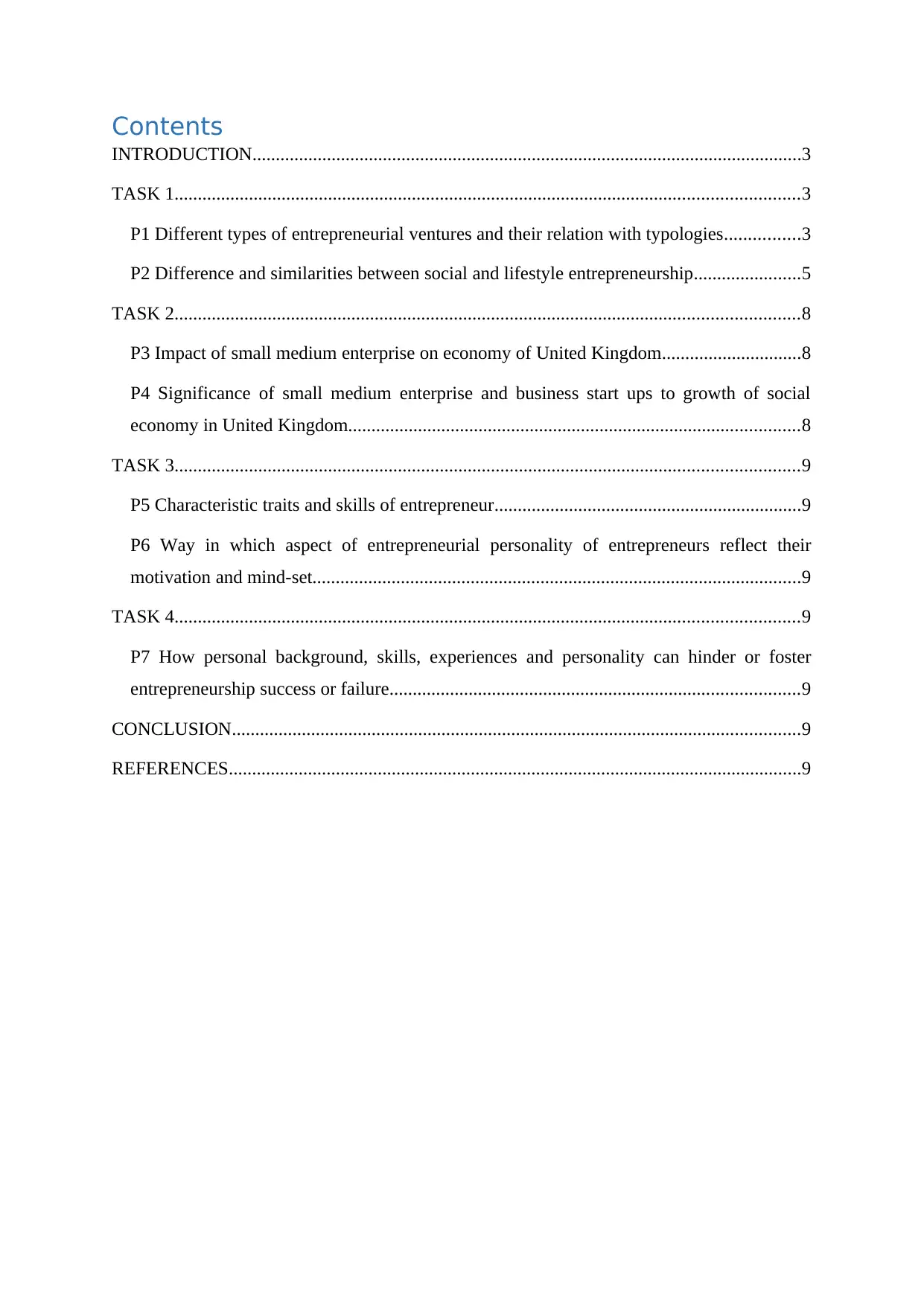
Contents
INTRODUCTION......................................................................................................................3
TASK 1......................................................................................................................................3
P1 Different types of entrepreneurial ventures and their relation with typologies................3
P2 Difference and similarities between social and lifestyle entrepreneurship.......................5
TASK 2......................................................................................................................................8
P3 Impact of small medium enterprise on economy of United Kingdom..............................8
P4 Significance of small medium enterprise and business start ups to growth of social
economy in United Kingdom.................................................................................................8
TASK 3......................................................................................................................................9
P5 Characteristic traits and skills of entrepreneur..................................................................9
P6 Way in which aspect of entrepreneurial personality of entrepreneurs reflect their
motivation and mind-set.........................................................................................................9
TASK 4......................................................................................................................................9
P7 How personal background, skills, experiences and personality can hinder or foster
entrepreneurship success or failure........................................................................................9
CONCLUSION..........................................................................................................................9
REFERENCES...........................................................................................................................9
INTRODUCTION......................................................................................................................3
TASK 1......................................................................................................................................3
P1 Different types of entrepreneurial ventures and their relation with typologies................3
P2 Difference and similarities between social and lifestyle entrepreneurship.......................5
TASK 2......................................................................................................................................8
P3 Impact of small medium enterprise on economy of United Kingdom..............................8
P4 Significance of small medium enterprise and business start ups to growth of social
economy in United Kingdom.................................................................................................8
TASK 3......................................................................................................................................9
P5 Characteristic traits and skills of entrepreneur..................................................................9
P6 Way in which aspect of entrepreneurial personality of entrepreneurs reflect their
motivation and mind-set.........................................................................................................9
TASK 4......................................................................................................................................9
P7 How personal background, skills, experiences and personality can hinder or foster
entrepreneurship success or failure........................................................................................9
CONCLUSION..........................................................................................................................9
REFERENCES...........................................................................................................................9
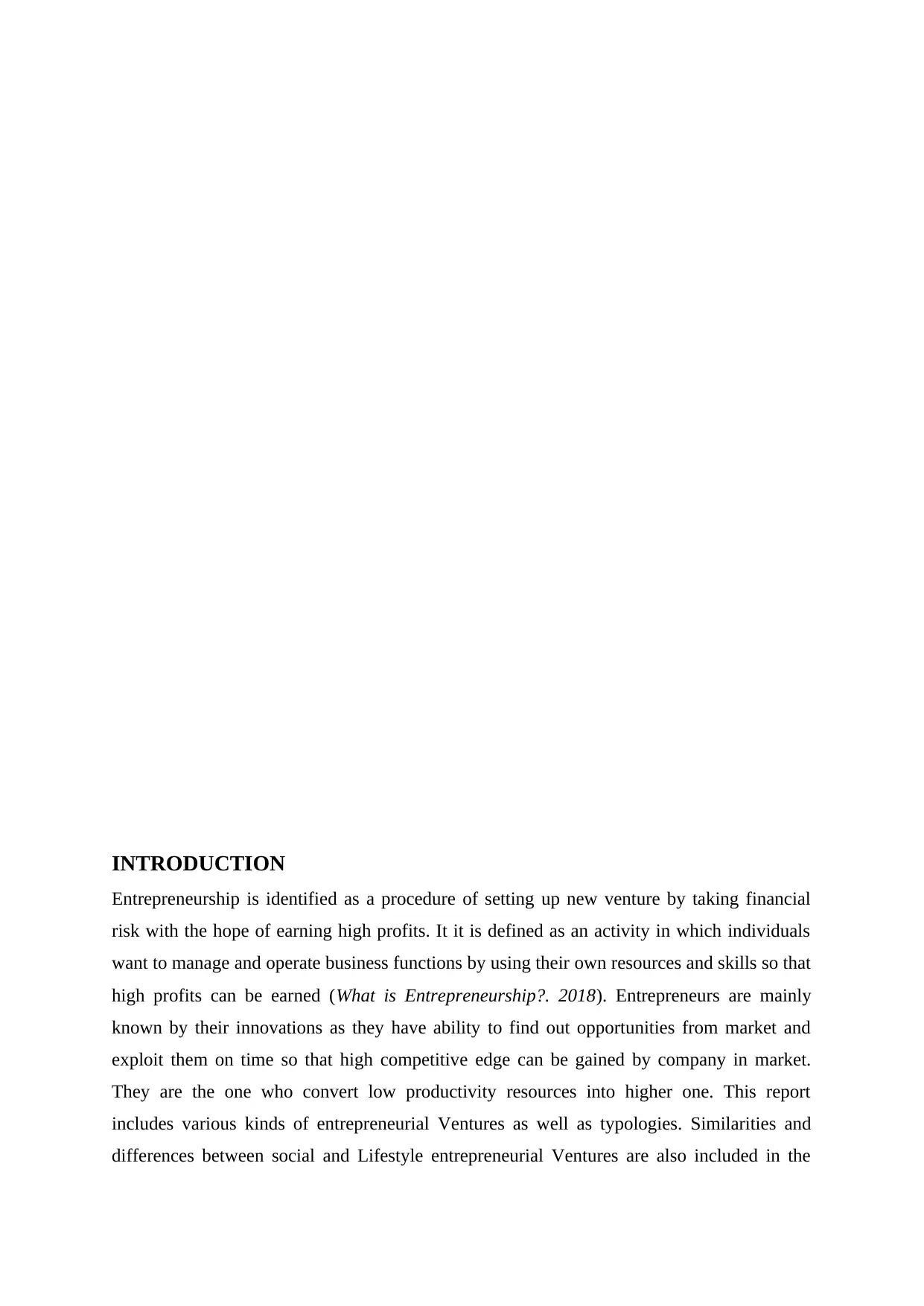
INTRODUCTION
Entrepreneurship is identified as a procedure of setting up new venture by taking financial
risk with the hope of earning high profits. It it is defined as an activity in which individuals
want to manage and operate business functions by using their own resources and skills so that
high profits can be earned (What is Entrepreneurship?. 2018). Entrepreneurs are mainly
known by their innovations as they have ability to find out opportunities from market and
exploit them on time so that high competitive edge can be gained by company in market.
They are the one who convert low productivity resources into higher one. This report
includes various kinds of entrepreneurial Ventures as well as typologies. Similarities and
differences between social and Lifestyle entrepreneurial Ventures are also included in the
Entrepreneurship is identified as a procedure of setting up new venture by taking financial
risk with the hope of earning high profits. It it is defined as an activity in which individuals
want to manage and operate business functions by using their own resources and skills so that
high profits can be earned (What is Entrepreneurship?. 2018). Entrepreneurs are mainly
known by their innovations as they have ability to find out opportunities from market and
exploit them on time so that high competitive edge can be gained by company in market.
They are the one who convert low productivity resources into higher one. This report
includes various kinds of entrepreneurial Ventures as well as typologies. Similarities and
differences between social and Lifestyle entrepreneurial Ventures are also included in the
⊘ This is a preview!⊘
Do you want full access?
Subscribe today to unlock all pages.

Trusted by 1+ million students worldwide
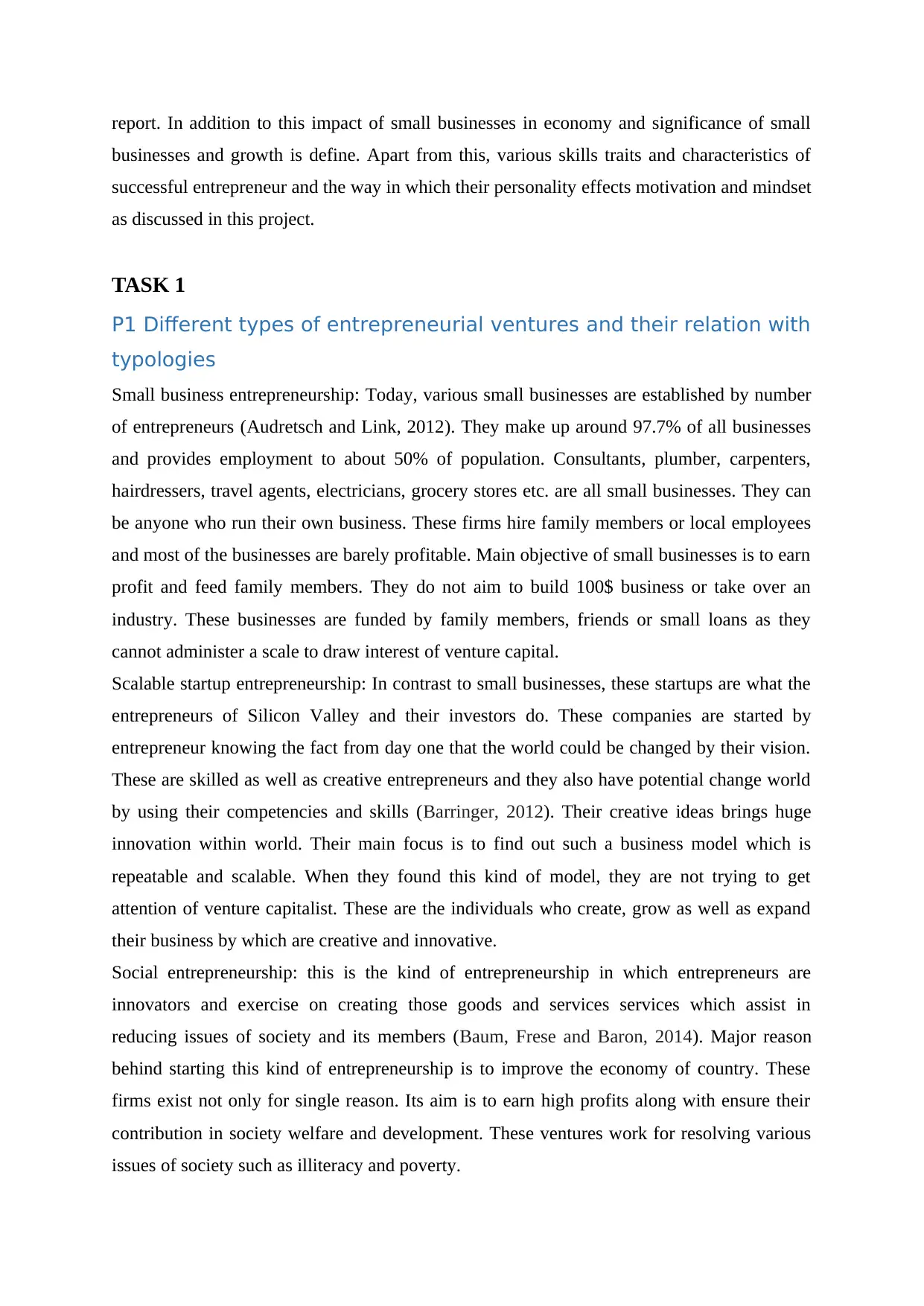
report. In addition to this impact of small businesses in economy and significance of small
businesses and growth is define. Apart from this, various skills traits and characteristics of
successful entrepreneur and the way in which their personality effects motivation and mindset
as discussed in this project.
TASK 1
P1 Different types of entrepreneurial ventures and their relation with
typologies
Small business entrepreneurship: Today, various small businesses are established by number
of entrepreneurs (Audretsch and Link, 2012). They make up around 97.7% of all businesses
and provides employment to about 50% of population. Consultants, plumber, carpenters,
hairdressers, travel agents, electricians, grocery stores etc. are all small businesses. They can
be anyone who run their own business. These firms hire family members or local employees
and most of the businesses are barely profitable. Main objective of small businesses is to earn
profit and feed family members. They do not aim to build 100$ business or take over an
industry. These businesses are funded by family members, friends or small loans as they
cannot administer a scale to draw interest of venture capital.
Scalable startup entrepreneurship: In contrast to small businesses, these startups are what the
entrepreneurs of Silicon Valley and their investors do. These companies are started by
entrepreneur knowing the fact from day one that the world could be changed by their vision.
These are skilled as well as creative entrepreneurs and they also have potential change world
by using their competencies and skills (Barringer, 2012). Their creative ideas brings huge
innovation within world. Their main focus is to find out such a business model which is
repeatable and scalable. When they found this kind of model, they are not trying to get
attention of venture capitalist. These are the individuals who create, grow as well as expand
their business by which are creative and innovative.
Social entrepreneurship: this is the kind of entrepreneurship in which entrepreneurs are
innovators and exercise on creating those goods and services services which assist in
reducing issues of society and its members (Baum, Frese and Baron, 2014). Major reason
behind starting this kind of entrepreneurship is to improve the economy of country. These
firms exist not only for single reason. Its aim is to earn high profits along with ensure their
contribution in society welfare and development. These ventures work for resolving various
issues of society such as illiteracy and poverty.
businesses and growth is define. Apart from this, various skills traits and characteristics of
successful entrepreneur and the way in which their personality effects motivation and mindset
as discussed in this project.
TASK 1
P1 Different types of entrepreneurial ventures and their relation with
typologies
Small business entrepreneurship: Today, various small businesses are established by number
of entrepreneurs (Audretsch and Link, 2012). They make up around 97.7% of all businesses
and provides employment to about 50% of population. Consultants, plumber, carpenters,
hairdressers, travel agents, electricians, grocery stores etc. are all small businesses. They can
be anyone who run their own business. These firms hire family members or local employees
and most of the businesses are barely profitable. Main objective of small businesses is to earn
profit and feed family members. They do not aim to build 100$ business or take over an
industry. These businesses are funded by family members, friends or small loans as they
cannot administer a scale to draw interest of venture capital.
Scalable startup entrepreneurship: In contrast to small businesses, these startups are what the
entrepreneurs of Silicon Valley and their investors do. These companies are started by
entrepreneur knowing the fact from day one that the world could be changed by their vision.
These are skilled as well as creative entrepreneurs and they also have potential change world
by using their competencies and skills (Barringer, 2012). Their creative ideas brings huge
innovation within world. Their main focus is to find out such a business model which is
repeatable and scalable. When they found this kind of model, they are not trying to get
attention of venture capitalist. These are the individuals who create, grow as well as expand
their business by which are creative and innovative.
Social entrepreneurship: this is the kind of entrepreneurship in which entrepreneurs are
innovators and exercise on creating those goods and services services which assist in
reducing issues of society and its members (Baum, Frese and Baron, 2014). Major reason
behind starting this kind of entrepreneurship is to improve the economy of country. These
firms exist not only for single reason. Its aim is to earn high profits along with ensure their
contribution in society welfare and development. These ventures work for resolving various
issues of society such as illiteracy and poverty.
Paraphrase This Document
Need a fresh take? Get an instant paraphrase of this document with our AI Paraphraser
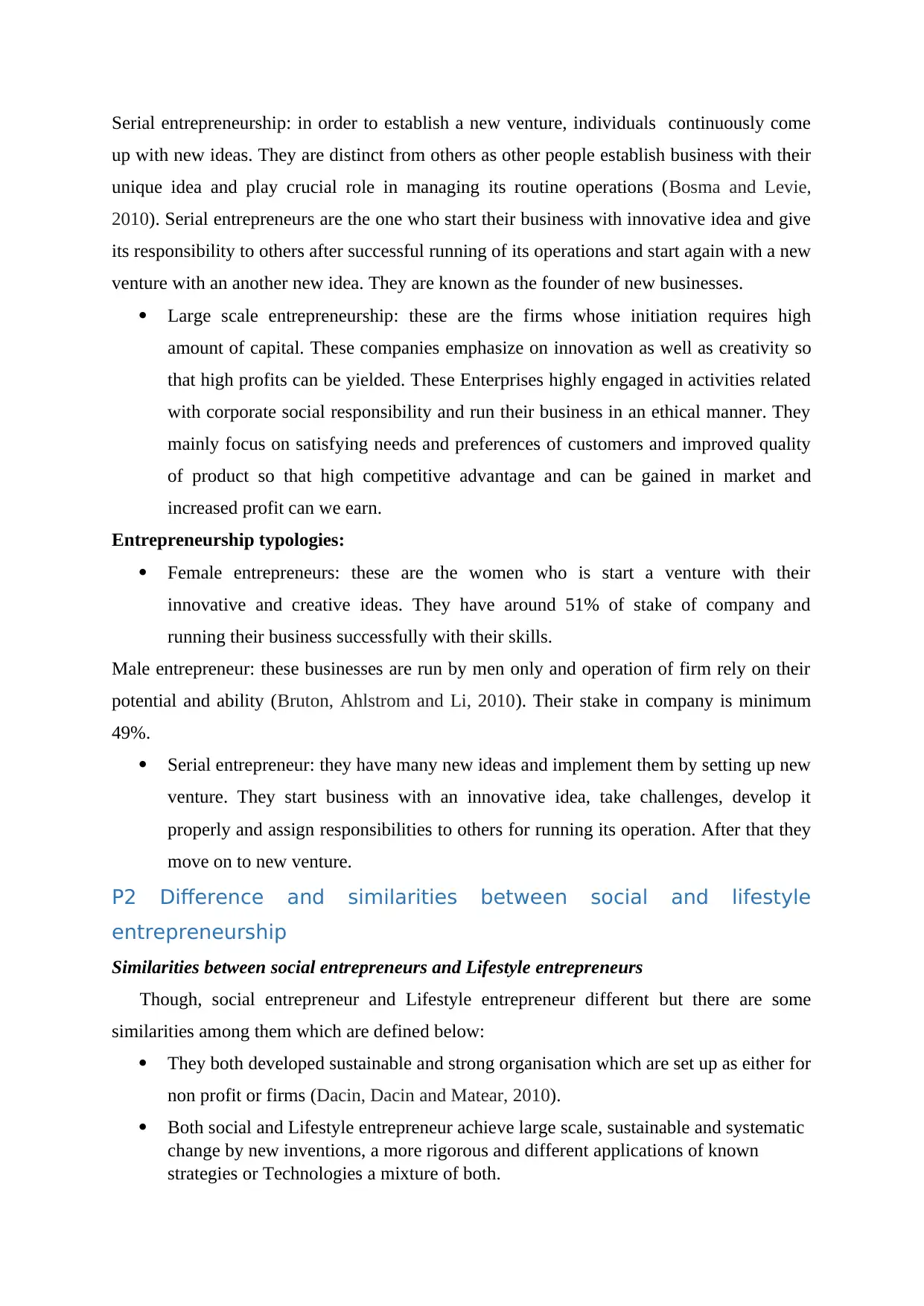
Serial entrepreneurship: in order to establish a new venture, individuals continuously come
up with new ideas. They are distinct from others as other people establish business with their
unique idea and play crucial role in managing its routine operations (Bosma and Levie,
2010). Serial entrepreneurs are the one who start their business with innovative idea and give
its responsibility to others after successful running of its operations and start again with a new
venture with an another new idea. They are known as the founder of new businesses.
Large scale entrepreneurship: these are the firms whose initiation requires high
amount of capital. These companies emphasize on innovation as well as creativity so
that high profits can be yielded. These Enterprises highly engaged in activities related
with corporate social responsibility and run their business in an ethical manner. They
mainly focus on satisfying needs and preferences of customers and improved quality
of product so that high competitive advantage and can be gained in market and
increased profit can we earn.
Entrepreneurship typologies:
Female entrepreneurs: these are the women who is start a venture with their
innovative and creative ideas. They have around 51% of stake of company and
running their business successfully with their skills.
Male entrepreneur: these businesses are run by men only and operation of firm rely on their
potential and ability (Bruton, Ahlstrom and Li, 2010). Their stake in company is minimum
49%.
Serial entrepreneur: they have many new ideas and implement them by setting up new
venture. They start business with an innovative idea, take challenges, develop it
properly and assign responsibilities to others for running its operation. After that they
move on to new venture.
P2 Difference and similarities between social and lifestyle
entrepreneurship
Similarities between social entrepreneurs and Lifestyle entrepreneurs
Though, social entrepreneur and Lifestyle entrepreneur different but there are some
similarities among them which are defined below:
They both developed sustainable and strong organisation which are set up as either for
non profit or firms (Dacin, Dacin and Matear, 2010).
Both social and Lifestyle entrepreneur achieve large scale, sustainable and systematic
change by new inventions, a more rigorous and different applications of known
strategies or Technologies a mixture of both.
up with new ideas. They are distinct from others as other people establish business with their
unique idea and play crucial role in managing its routine operations (Bosma and Levie,
2010). Serial entrepreneurs are the one who start their business with innovative idea and give
its responsibility to others after successful running of its operations and start again with a new
venture with an another new idea. They are known as the founder of new businesses.
Large scale entrepreneurship: these are the firms whose initiation requires high
amount of capital. These companies emphasize on innovation as well as creativity so
that high profits can be yielded. These Enterprises highly engaged in activities related
with corporate social responsibility and run their business in an ethical manner. They
mainly focus on satisfying needs and preferences of customers and improved quality
of product so that high competitive advantage and can be gained in market and
increased profit can we earn.
Entrepreneurship typologies:
Female entrepreneurs: these are the women who is start a venture with their
innovative and creative ideas. They have around 51% of stake of company and
running their business successfully with their skills.
Male entrepreneur: these businesses are run by men only and operation of firm rely on their
potential and ability (Bruton, Ahlstrom and Li, 2010). Their stake in company is minimum
49%.
Serial entrepreneur: they have many new ideas and implement them by setting up new
venture. They start business with an innovative idea, take challenges, develop it
properly and assign responsibilities to others for running its operation. After that they
move on to new venture.
P2 Difference and similarities between social and lifestyle
entrepreneurship
Similarities between social entrepreneurs and Lifestyle entrepreneurs
Though, social entrepreneur and Lifestyle entrepreneur different but there are some
similarities among them which are defined below:
They both developed sustainable and strong organisation which are set up as either for
non profit or firms (Dacin, Dacin and Matear, 2010).
Both social and Lifestyle entrepreneur achieve large scale, sustainable and systematic
change by new inventions, a more rigorous and different applications of known
strategies or Technologies a mixture of both.
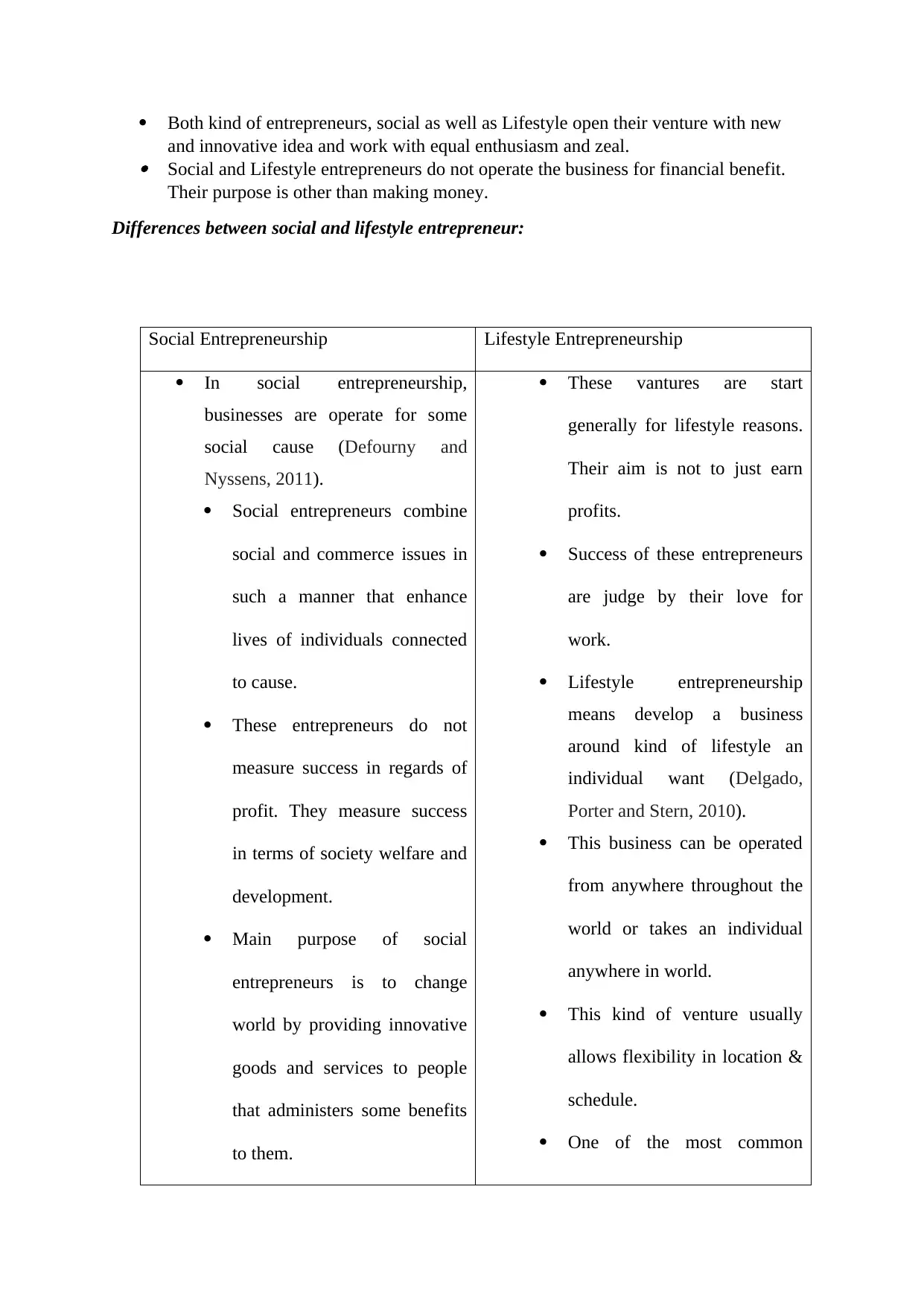
Both kind of entrepreneurs, social as well as Lifestyle open their venture with new
and innovative idea and work with equal enthusiasm and zeal.
Social and Lifestyle entrepreneurs do not operate the business for financial benefit.
Their purpose is other than making money.
Differences between social and lifestyle entrepreneur:
Social Entrepreneurship Lifestyle Entrepreneurship
In social entrepreneurship,
businesses are operate for some
social cause (Defourny and
Nyssens, 2011).
Social entrepreneurs combine
social and commerce issues in
such a manner that enhance
lives of individuals connected
to cause.
These entrepreneurs do not
measure success in regards of
profit. They measure success
in terms of society welfare and
development.
Main purpose of social
entrepreneurs is to change
world by providing innovative
goods and services to people
that administers some benefits
to them.
These vantures are start
generally for lifestyle reasons.
Their aim is not to just earn
profits.
Success of these entrepreneurs
are judge by their love for
work.
Lifestyle entrepreneurship
means develop a business
around kind of lifestyle an
individual want (Delgado,
Porter and Stern, 2010).
This business can be operated
from anywhere throughout the
world or takes an individual
anywhere in world.
This kind of venture usually
allows flexibility in location &
schedule.
One of the most common
and innovative idea and work with equal enthusiasm and zeal.
Social and Lifestyle entrepreneurs do not operate the business for financial benefit.
Their purpose is other than making money.
Differences between social and lifestyle entrepreneur:
Social Entrepreneurship Lifestyle Entrepreneurship
In social entrepreneurship,
businesses are operate for some
social cause (Defourny and
Nyssens, 2011).
Social entrepreneurs combine
social and commerce issues in
such a manner that enhance
lives of individuals connected
to cause.
These entrepreneurs do not
measure success in regards of
profit. They measure success
in terms of society welfare and
development.
Main purpose of social
entrepreneurs is to change
world by providing innovative
goods and services to people
that administers some benefits
to them.
These vantures are start
generally for lifestyle reasons.
Their aim is not to just earn
profits.
Success of these entrepreneurs
are judge by their love for
work.
Lifestyle entrepreneurship
means develop a business
around kind of lifestyle an
individual want (Delgado,
Porter and Stern, 2010).
This business can be operated
from anywhere throughout the
world or takes an individual
anywhere in world.
This kind of venture usually
allows flexibility in location &
schedule.
One of the most common
⊘ This is a preview!⊘
Do you want full access?
Subscribe today to unlock all pages.

Trusted by 1+ million students worldwide
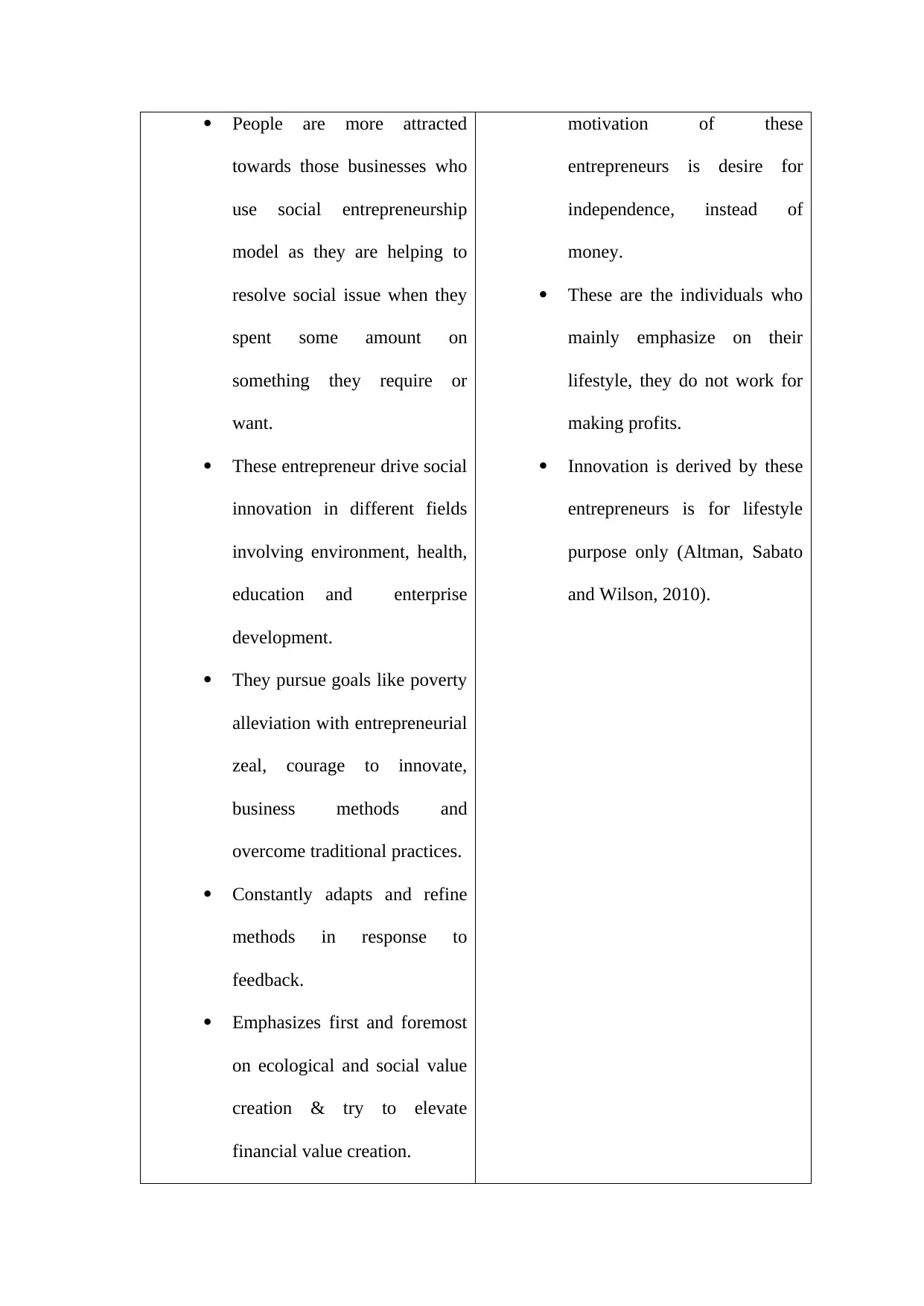
People are more attracted
towards those businesses who
use social entrepreneurship
model as they are helping to
resolve social issue when they
spent some amount on
something they require or
want.
These entrepreneur drive social
innovation in different fields
involving environment, health,
education and enterprise
development.
They pursue goals like poverty
alleviation with entrepreneurial
zeal, courage to innovate,
business methods and
overcome traditional practices.
Constantly adapts and refine
methods in response to
feedback.
Emphasizes first and foremost
on ecological and social value
creation & try to elevate
financial value creation.
motivation of these
entrepreneurs is desire for
independence, instead of
money.
These are the individuals who
mainly emphasize on their
lifestyle, they do not work for
making profits.
Innovation is derived by these
entrepreneurs is for lifestyle
purpose only (Altman, Sabato
and Wilson, 2010).
towards those businesses who
use social entrepreneurship
model as they are helping to
resolve social issue when they
spent some amount on
something they require or
want.
These entrepreneur drive social
innovation in different fields
involving environment, health,
education and enterprise
development.
They pursue goals like poverty
alleviation with entrepreneurial
zeal, courage to innovate,
business methods and
overcome traditional practices.
Constantly adapts and refine
methods in response to
feedback.
Emphasizes first and foremost
on ecological and social value
creation & try to elevate
financial value creation.
motivation of these
entrepreneurs is desire for
independence, instead of
money.
These are the individuals who
mainly emphasize on their
lifestyle, they do not work for
making profits.
Innovation is derived by these
entrepreneurs is for lifestyle
purpose only (Altman, Sabato
and Wilson, 2010).
Paraphrase This Document
Need a fresh take? Get an instant paraphrase of this document with our AI Paraphraser
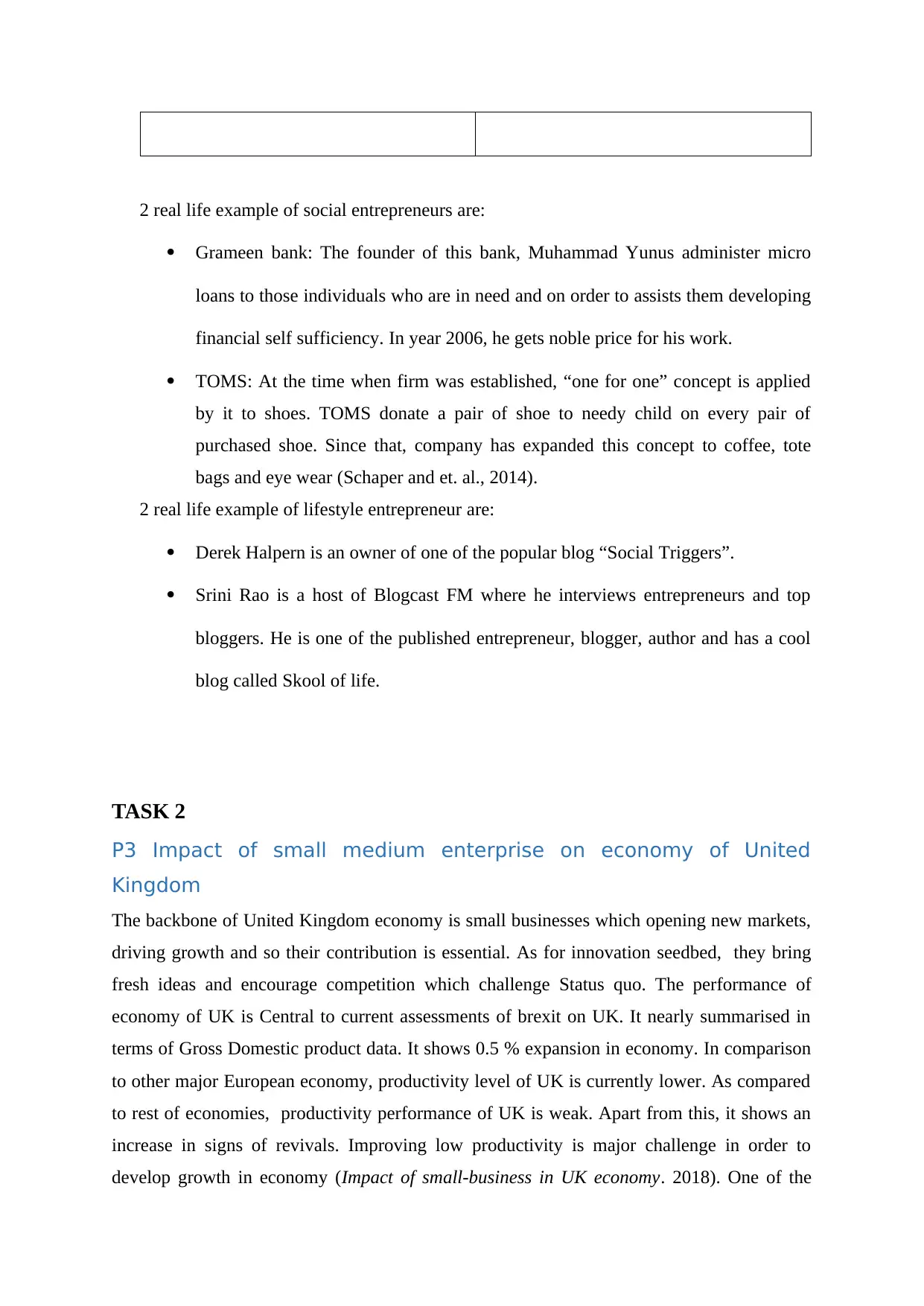
2 real life example of social entrepreneurs are:
Grameen bank: The founder of this bank, Muhammad Yunus administer micro
loans to those individuals who are in need and on order to assists them developing
financial self sufficiency. In year 2006, he gets noble price for his work.
TOMS: At the time when firm was established, “one for one” concept is applied
by it to shoes. TOMS donate a pair of shoe to needy child on every pair of
purchased shoe. Since that, company has expanded this concept to coffee, tote
bags and eye wear (Schaper and et. al., 2014).
2 real life example of lifestyle entrepreneur are:
Derek Halpern is an owner of one of the popular blog “Social Triggers”.
Srini Rao is a host of Blogcast FM where he interviews entrepreneurs and top
bloggers. He is one of the published entrepreneur, blogger, author and has a cool
blog called Skool of life.
TASK 2
P3 Impact of small medium enterprise on economy of United
Kingdom
The backbone of United Kingdom economy is small businesses which opening new markets,
driving growth and so their contribution is essential. As for innovation seedbed, they bring
fresh ideas and encourage competition which challenge Status quo. The performance of
economy of UK is Central to current assessments of brexit on UK. It nearly summarised in
terms of Gross Domestic product data. It shows 0.5 % expansion in economy. In comparison
to other major European economy, productivity level of UK is currently lower. As compared
to rest of economies, productivity performance of UK is weak. Apart from this, it shows an
increase in signs of revivals. Improving low productivity is major challenge in order to
develop growth in economy (Impact of small-business in UK economy. 2018). One of the
Grameen bank: The founder of this bank, Muhammad Yunus administer micro
loans to those individuals who are in need and on order to assists them developing
financial self sufficiency. In year 2006, he gets noble price for his work.
TOMS: At the time when firm was established, “one for one” concept is applied
by it to shoes. TOMS donate a pair of shoe to needy child on every pair of
purchased shoe. Since that, company has expanded this concept to coffee, tote
bags and eye wear (Schaper and et. al., 2014).
2 real life example of lifestyle entrepreneur are:
Derek Halpern is an owner of one of the popular blog “Social Triggers”.
Srini Rao is a host of Blogcast FM where he interviews entrepreneurs and top
bloggers. He is one of the published entrepreneur, blogger, author and has a cool
blog called Skool of life.
TASK 2
P3 Impact of small medium enterprise on economy of United
Kingdom
The backbone of United Kingdom economy is small businesses which opening new markets,
driving growth and so their contribution is essential. As for innovation seedbed, they bring
fresh ideas and encourage competition which challenge Status quo. The performance of
economy of UK is Central to current assessments of brexit on UK. It nearly summarised in
terms of Gross Domestic product data. It shows 0.5 % expansion in economy. In comparison
to other major European economy, productivity level of UK is currently lower. As compared
to rest of economies, productivity performance of UK is weak. Apart from this, it shows an
increase in signs of revivals. Improving low productivity is major challenge in order to
develop growth in economy (Impact of small-business in UK economy. 2018). One of the
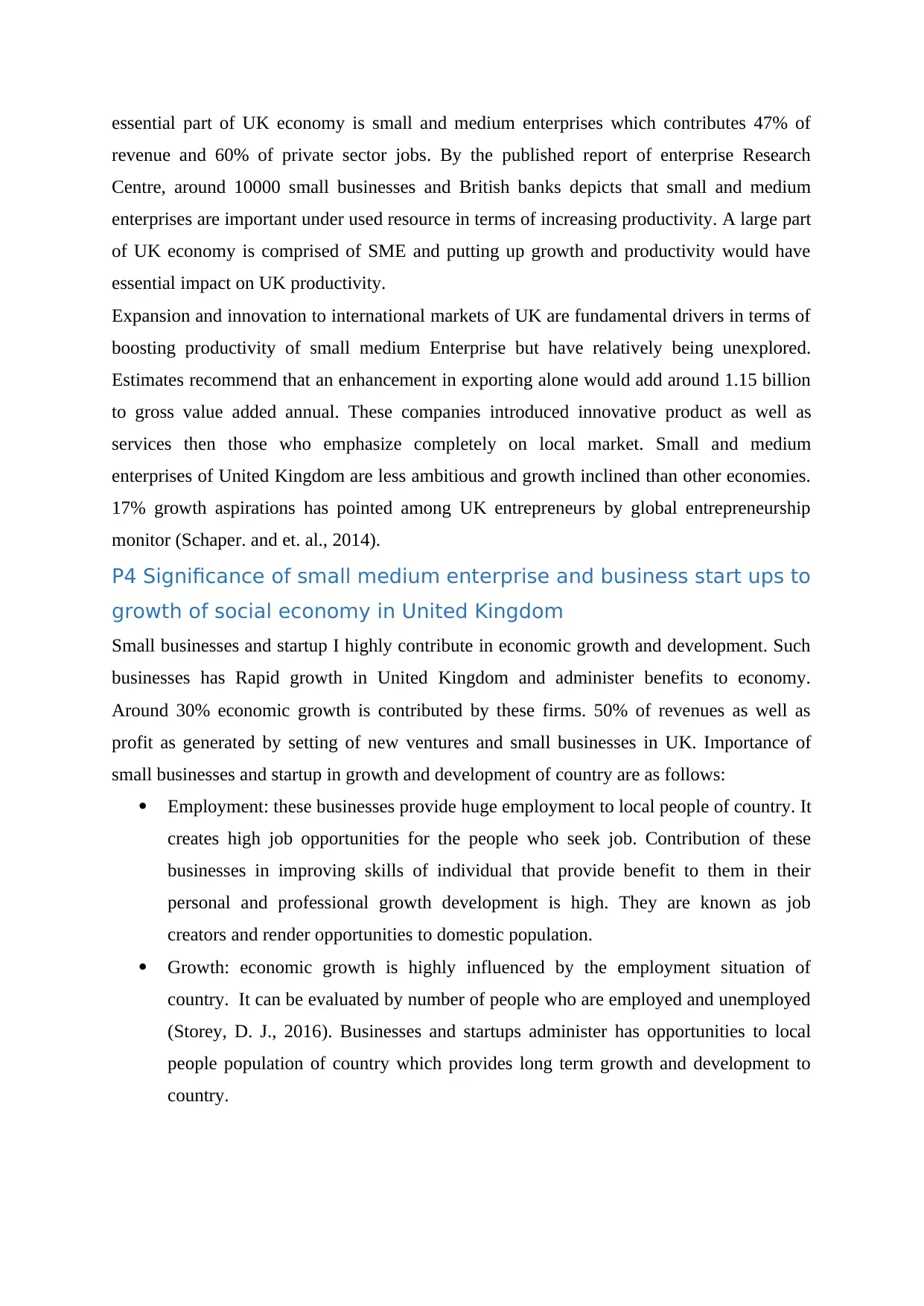
essential part of UK economy is small and medium enterprises which contributes 47% of
revenue and 60% of private sector jobs. By the published report of enterprise Research
Centre, around 10000 small businesses and British banks depicts that small and medium
enterprises are important under used resource in terms of increasing productivity. A large part
of UK economy is comprised of SME and putting up growth and productivity would have
essential impact on UK productivity.
Expansion and innovation to international markets of UK are fundamental drivers in terms of
boosting productivity of small medium Enterprise but have relatively being unexplored.
Estimates recommend that an enhancement in exporting alone would add around 1.15 billion
to gross value added annual. These companies introduced innovative product as well as
services then those who emphasize completely on local market. Small and medium
enterprises of United Kingdom are less ambitious and growth inclined than other economies.
17% growth aspirations has pointed among UK entrepreneurs by global entrepreneurship
monitor (Schaper. and et. al., 2014).
P4 Significance of small medium enterprise and business start ups to
growth of social economy in United Kingdom
Small businesses and startup I highly contribute in economic growth and development. Such
businesses has Rapid growth in United Kingdom and administer benefits to economy.
Around 30% economic growth is contributed by these firms. 50% of revenues as well as
profit as generated by setting of new ventures and small businesses in UK. Importance of
small businesses and startup in growth and development of country are as follows:
Employment: these businesses provide huge employment to local people of country. It
creates high job opportunities for the people who seek job. Contribution of these
businesses in improving skills of individual that provide benefit to them in their
personal and professional growth development is high. They are known as job
creators and render opportunities to domestic population.
Growth: economic growth is highly influenced by the employment situation of
country. It can be evaluated by number of people who are employed and unemployed
(Storey, D. J., 2016). Businesses and startups administer has opportunities to local
people population of country which provides long term growth and development to
country.
revenue and 60% of private sector jobs. By the published report of enterprise Research
Centre, around 10000 small businesses and British banks depicts that small and medium
enterprises are important under used resource in terms of increasing productivity. A large part
of UK economy is comprised of SME and putting up growth and productivity would have
essential impact on UK productivity.
Expansion and innovation to international markets of UK are fundamental drivers in terms of
boosting productivity of small medium Enterprise but have relatively being unexplored.
Estimates recommend that an enhancement in exporting alone would add around 1.15 billion
to gross value added annual. These companies introduced innovative product as well as
services then those who emphasize completely on local market. Small and medium
enterprises of United Kingdom are less ambitious and growth inclined than other economies.
17% growth aspirations has pointed among UK entrepreneurs by global entrepreneurship
monitor (Schaper. and et. al., 2014).
P4 Significance of small medium enterprise and business start ups to
growth of social economy in United Kingdom
Small businesses and startup I highly contribute in economic growth and development. Such
businesses has Rapid growth in United Kingdom and administer benefits to economy.
Around 30% economic growth is contributed by these firms. 50% of revenues as well as
profit as generated by setting of new ventures and small businesses in UK. Importance of
small businesses and startup in growth and development of country are as follows:
Employment: these businesses provide huge employment to local people of country. It
creates high job opportunities for the people who seek job. Contribution of these
businesses in improving skills of individual that provide benefit to them in their
personal and professional growth development is high. They are known as job
creators and render opportunities to domestic population.
Growth: economic growth is highly influenced by the employment situation of
country. It can be evaluated by number of people who are employed and unemployed
(Storey, D. J., 2016). Businesses and startups administer has opportunities to local
people population of country which provides long term growth and development to
country.
⊘ This is a preview!⊘
Do you want full access?
Subscribe today to unlock all pages.

Trusted by 1+ million students worldwide
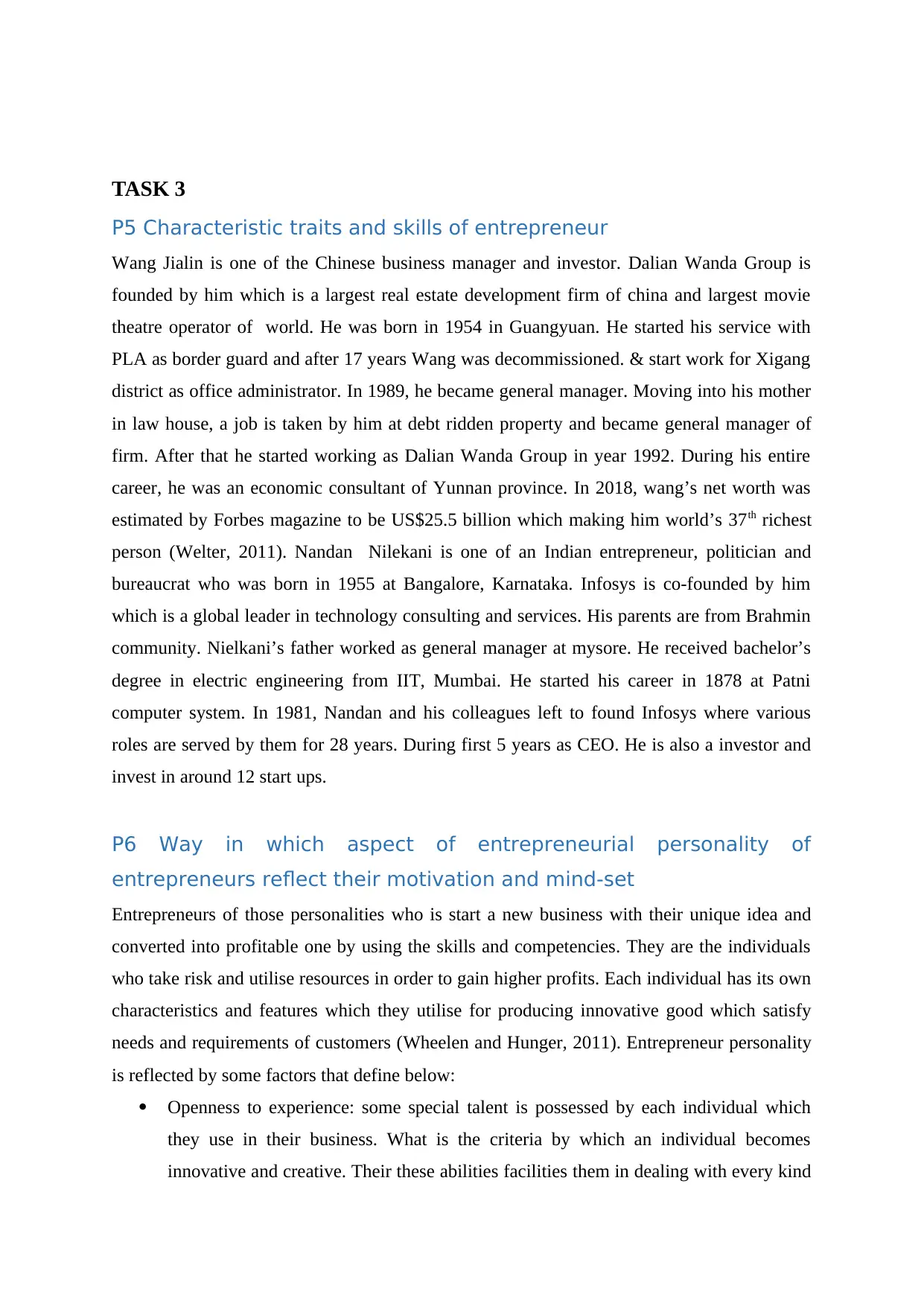
TASK 3
P5 Characteristic traits and skills of entrepreneur
Wang Jialin is one of the Chinese business manager and investor. Dalian Wanda Group is
founded by him which is a largest real estate development firm of china and largest movie
theatre operator of world. He was born in 1954 in Guangyuan. He started his service with
PLA as border guard and after 17 years Wang was decommissioned. & start work for Xigang
district as office administrator. In 1989, he became general manager. Moving into his mother
in law house, a job is taken by him at debt ridden property and became general manager of
firm. After that he started working as Dalian Wanda Group in year 1992. During his entire
career, he was an economic consultant of Yunnan province. In 2018, wang’s net worth was
estimated by Forbes magazine to be US$25.5 billion which making him world’s 37th richest
person (Welter, 2011). Nandan Nilekani is one of an Indian entrepreneur, politician and
bureaucrat who was born in 1955 at Bangalore, Karnataka. Infosys is co-founded by him
which is a global leader in technology consulting and services. His parents are from Brahmin
community. Nielkani’s father worked as general manager at mysore. He received bachelor’s
degree in electric engineering from IIT, Mumbai. He started his career in 1878 at Patni
computer system. In 1981, Nandan and his colleagues left to found Infosys where various
roles are served by them for 28 years. During first 5 years as CEO. He is also a investor and
invest in around 12 start ups.
P6 Way in which aspect of entrepreneurial personality of
entrepreneurs reflect their motivation and mind-set
Entrepreneurs of those personalities who is start a new business with their unique idea and
converted into profitable one by using the skills and competencies. They are the individuals
who take risk and utilise resources in order to gain higher profits. Each individual has its own
characteristics and features which they utilise for producing innovative good which satisfy
needs and requirements of customers (Wheelen and Hunger, 2011). Entrepreneur personality
is reflected by some factors that define below:
Openness to experience: some special talent is possessed by each individual which
they use in their business. What is the criteria by which an individual becomes
innovative and creative. Their these abilities facilities them in dealing with every kind
P5 Characteristic traits and skills of entrepreneur
Wang Jialin is one of the Chinese business manager and investor. Dalian Wanda Group is
founded by him which is a largest real estate development firm of china and largest movie
theatre operator of world. He was born in 1954 in Guangyuan. He started his service with
PLA as border guard and after 17 years Wang was decommissioned. & start work for Xigang
district as office administrator. In 1989, he became general manager. Moving into his mother
in law house, a job is taken by him at debt ridden property and became general manager of
firm. After that he started working as Dalian Wanda Group in year 1992. During his entire
career, he was an economic consultant of Yunnan province. In 2018, wang’s net worth was
estimated by Forbes magazine to be US$25.5 billion which making him world’s 37th richest
person (Welter, 2011). Nandan Nilekani is one of an Indian entrepreneur, politician and
bureaucrat who was born in 1955 at Bangalore, Karnataka. Infosys is co-founded by him
which is a global leader in technology consulting and services. His parents are from Brahmin
community. Nielkani’s father worked as general manager at mysore. He received bachelor’s
degree in electric engineering from IIT, Mumbai. He started his career in 1878 at Patni
computer system. In 1981, Nandan and his colleagues left to found Infosys where various
roles are served by them for 28 years. During first 5 years as CEO. He is also a investor and
invest in around 12 start ups.
P6 Way in which aspect of entrepreneurial personality of
entrepreneurs reflect their motivation and mind-set
Entrepreneurs of those personalities who is start a new business with their unique idea and
converted into profitable one by using the skills and competencies. They are the individuals
who take risk and utilise resources in order to gain higher profits. Each individual has its own
characteristics and features which they utilise for producing innovative good which satisfy
needs and requirements of customers (Wheelen and Hunger, 2011). Entrepreneur personality
is reflected by some factors that define below:
Openness to experience: some special talent is possessed by each individual which
they use in their business. What is the criteria by which an individual becomes
innovative and creative. Their these abilities facilities them in dealing with every kind
Paraphrase This Document
Need a fresh take? Get an instant paraphrase of this document with our AI Paraphraser
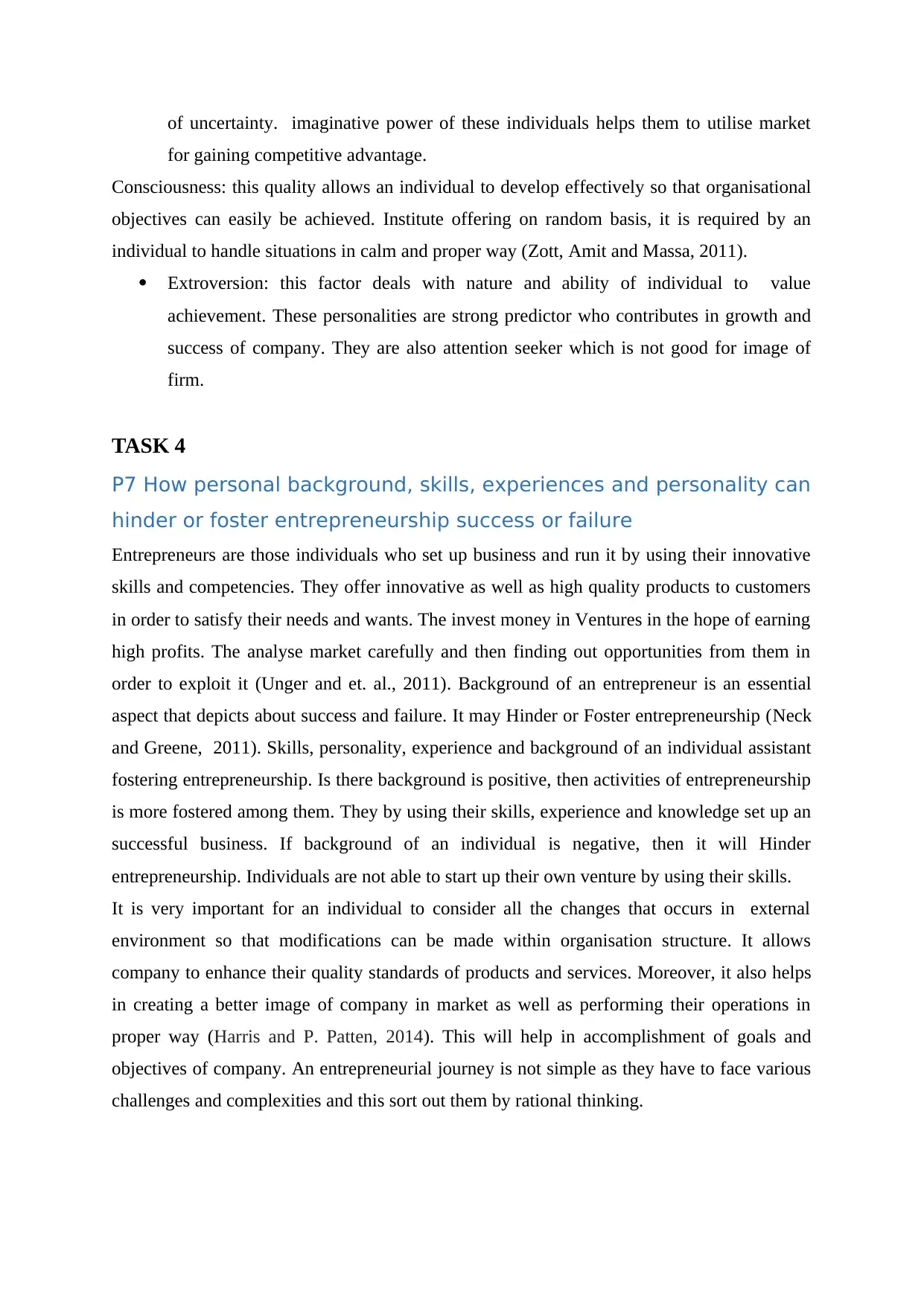
of uncertainty. imaginative power of these individuals helps them to utilise market
for gaining competitive advantage.
Consciousness: this quality allows an individual to develop effectively so that organisational
objectives can easily be achieved. Institute offering on random basis, it is required by an
individual to handle situations in calm and proper way (Zott, Amit and Massa, 2011).
Extroversion: this factor deals with nature and ability of individual to value
achievement. These personalities are strong predictor who contributes in growth and
success of company. They are also attention seeker which is not good for image of
firm.
TASK 4
P7 How personal background, skills, experiences and personality can
hinder or foster entrepreneurship success or failure
Entrepreneurs are those individuals who set up business and run it by using their innovative
skills and competencies. They offer innovative as well as high quality products to customers
in order to satisfy their needs and wants. The invest money in Ventures in the hope of earning
high profits. The analyse market carefully and then finding out opportunities from them in
order to exploit it (Unger and et. al., 2011). Background of an entrepreneur is an essential
aspect that depicts about success and failure. It may Hinder or Foster entrepreneurship (Neck
and Greene, 2011). Skills, personality, experience and background of an individual assistant
fostering entrepreneurship. Is there background is positive, then activities of entrepreneurship
is more fostered among them. They by using their skills, experience and knowledge set up an
successful business. If background of an individual is negative, then it will Hinder
entrepreneurship. Individuals are not able to start up their own venture by using their skills.
It is very important for an individual to consider all the changes that occurs in external
environment so that modifications can be made within organisation structure. It allows
company to enhance their quality standards of products and services. Moreover, it also helps
in creating a better image of company in market as well as performing their operations in
proper way (Harris and P. Patten, 2014). This will help in accomplishment of goals and
objectives of company. An entrepreneurial journey is not simple as they have to face various
challenges and complexities and this sort out them by rational thinking.
for gaining competitive advantage.
Consciousness: this quality allows an individual to develop effectively so that organisational
objectives can easily be achieved. Institute offering on random basis, it is required by an
individual to handle situations in calm and proper way (Zott, Amit and Massa, 2011).
Extroversion: this factor deals with nature and ability of individual to value
achievement. These personalities are strong predictor who contributes in growth and
success of company. They are also attention seeker which is not good for image of
firm.
TASK 4
P7 How personal background, skills, experiences and personality can
hinder or foster entrepreneurship success or failure
Entrepreneurs are those individuals who set up business and run it by using their innovative
skills and competencies. They offer innovative as well as high quality products to customers
in order to satisfy their needs and wants. The invest money in Ventures in the hope of earning
high profits. The analyse market carefully and then finding out opportunities from them in
order to exploit it (Unger and et. al., 2011). Background of an entrepreneur is an essential
aspect that depicts about success and failure. It may Hinder or Foster entrepreneurship (Neck
and Greene, 2011). Skills, personality, experience and background of an individual assistant
fostering entrepreneurship. Is there background is positive, then activities of entrepreneurship
is more fostered among them. They by using their skills, experience and knowledge set up an
successful business. If background of an individual is negative, then it will Hinder
entrepreneurship. Individuals are not able to start up their own venture by using their skills.
It is very important for an individual to consider all the changes that occurs in external
environment so that modifications can be made within organisation structure. It allows
company to enhance their quality standards of products and services. Moreover, it also helps
in creating a better image of company in market as well as performing their operations in
proper way (Harris and P. Patten, 2014). This will help in accomplishment of goals and
objectives of company. An entrepreneurial journey is not simple as they have to face various
challenges and complexities and this sort out them by rational thinking.
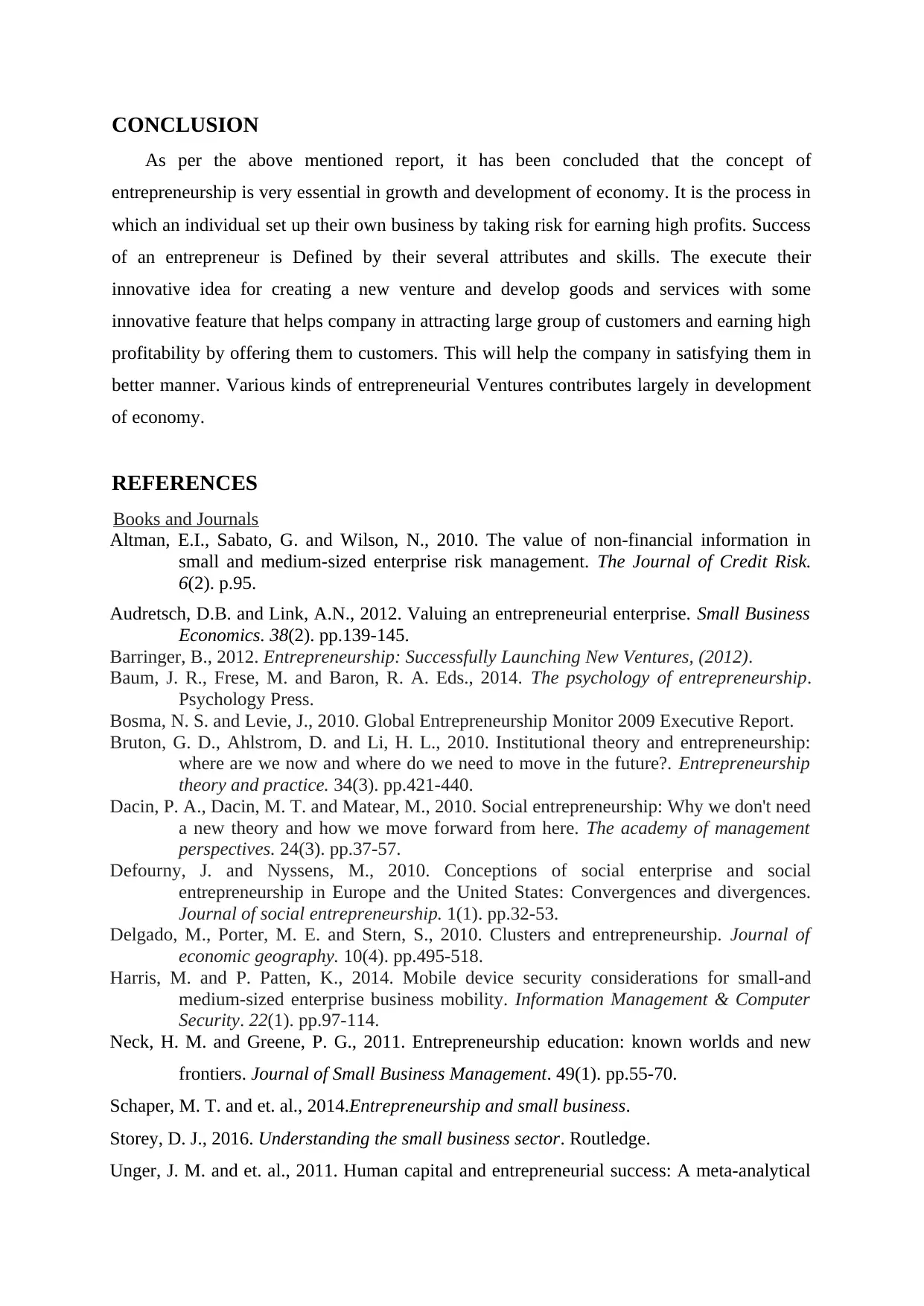
CONCLUSION
As per the above mentioned report, it has been concluded that the concept of
entrepreneurship is very essential in growth and development of economy. It is the process in
which an individual set up their own business by taking risk for earning high profits. Success
of an entrepreneur is Defined by their several attributes and skills. The execute their
innovative idea for creating a new venture and develop goods and services with some
innovative feature that helps company in attracting large group of customers and earning high
profitability by offering them to customers. This will help the company in satisfying them in
better manner. Various kinds of entrepreneurial Ventures contributes largely in development
of economy.
REFERENCES
Books and Journals
Altman, E.I., Sabato, G. and Wilson, N., 2010. The value of non-financial information in
small and medium-sized enterprise risk management. The Journal of Credit Risk.
6(2). p.95.
Audretsch, D.B. and Link, A.N., 2012. Valuing an entrepreneurial enterprise. Small Business
Economics. 38(2). pp.139-145.
Barringer, B., 2012. Entrepreneurship: Successfully Launching New Ventures, (2012).
Baum, J. R., Frese, M. and Baron, R. A. Eds., 2014. The psychology of entrepreneurship.
Psychology Press.
Bosma, N. S. and Levie, J., 2010. Global Entrepreneurship Monitor 2009 Executive Report.
Bruton, G. D., Ahlstrom, D. and Li, H. L., 2010. Institutional theory and entrepreneurship:
where are we now and where do we need to move in the future?. Entrepreneurship
theory and practice. 34(3). pp.421-440.
Dacin, P. A., Dacin, M. T. and Matear, M., 2010. Social entrepreneurship: Why we don't need
a new theory and how we move forward from here. The academy of management
perspectives. 24(3). pp.37-57.
Defourny, J. and Nyssens, M., 2010. Conceptions of social enterprise and social
entrepreneurship in Europe and the United States: Convergences and divergences.
Journal of social entrepreneurship. 1(1). pp.32-53.
Delgado, M., Porter, M. E. and Stern, S., 2010. Clusters and entrepreneurship. Journal of
economic geography. 10(4). pp.495-518.
Harris, M. and P. Patten, K., 2014. Mobile device security considerations for small-and
medium-sized enterprise business mobility. Information Management & Computer
Security. 22(1). pp.97-114.
Neck, H. M. and Greene, P. G., 2011. Entrepreneurship education: known worlds and new
frontiers. Journal of Small Business Management. 49(1). pp.55-70.
Schaper, M. T. and et. al., 2014.Entrepreneurship and small business.
Storey, D. J., 2016. Understanding the small business sector. Routledge.
Unger, J. M. and et. al., 2011. Human capital and entrepreneurial success: A meta-analytical
As per the above mentioned report, it has been concluded that the concept of
entrepreneurship is very essential in growth and development of economy. It is the process in
which an individual set up their own business by taking risk for earning high profits. Success
of an entrepreneur is Defined by their several attributes and skills. The execute their
innovative idea for creating a new venture and develop goods and services with some
innovative feature that helps company in attracting large group of customers and earning high
profitability by offering them to customers. This will help the company in satisfying them in
better manner. Various kinds of entrepreneurial Ventures contributes largely in development
of economy.
REFERENCES
Books and Journals
Altman, E.I., Sabato, G. and Wilson, N., 2010. The value of non-financial information in
small and medium-sized enterprise risk management. The Journal of Credit Risk.
6(2). p.95.
Audretsch, D.B. and Link, A.N., 2012. Valuing an entrepreneurial enterprise. Small Business
Economics. 38(2). pp.139-145.
Barringer, B., 2012. Entrepreneurship: Successfully Launching New Ventures, (2012).
Baum, J. R., Frese, M. and Baron, R. A. Eds., 2014. The psychology of entrepreneurship.
Psychology Press.
Bosma, N. S. and Levie, J., 2010. Global Entrepreneurship Monitor 2009 Executive Report.
Bruton, G. D., Ahlstrom, D. and Li, H. L., 2010. Institutional theory and entrepreneurship:
where are we now and where do we need to move in the future?. Entrepreneurship
theory and practice. 34(3). pp.421-440.
Dacin, P. A., Dacin, M. T. and Matear, M., 2010. Social entrepreneurship: Why we don't need
a new theory and how we move forward from here. The academy of management
perspectives. 24(3). pp.37-57.
Defourny, J. and Nyssens, M., 2010. Conceptions of social enterprise and social
entrepreneurship in Europe and the United States: Convergences and divergences.
Journal of social entrepreneurship. 1(1). pp.32-53.
Delgado, M., Porter, M. E. and Stern, S., 2010. Clusters and entrepreneurship. Journal of
economic geography. 10(4). pp.495-518.
Harris, M. and P. Patten, K., 2014. Mobile device security considerations for small-and
medium-sized enterprise business mobility. Information Management & Computer
Security. 22(1). pp.97-114.
Neck, H. M. and Greene, P. G., 2011. Entrepreneurship education: known worlds and new
frontiers. Journal of Small Business Management. 49(1). pp.55-70.
Schaper, M. T. and et. al., 2014.Entrepreneurship and small business.
Storey, D. J., 2016. Understanding the small business sector. Routledge.
Unger, J. M. and et. al., 2011. Human capital and entrepreneurial success: A meta-analytical
⊘ This is a preview!⊘
Do you want full access?
Subscribe today to unlock all pages.

Trusted by 1+ million students worldwide
1 out of 13
Related Documents
Your All-in-One AI-Powered Toolkit for Academic Success.
+13062052269
info@desklib.com
Available 24*7 on WhatsApp / Email
![[object Object]](/_next/static/media/star-bottom.7253800d.svg)
Unlock your academic potential
Copyright © 2020–2026 A2Z Services. All Rights Reserved. Developed and managed by ZUCOL.





